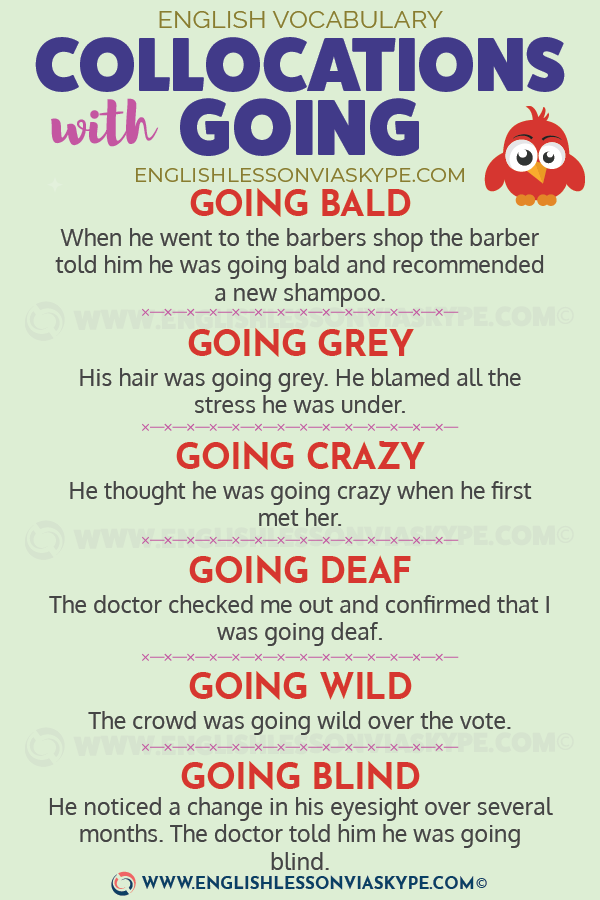Here you will learn common expressions with GO and useful collocations with GOING.
Table of Contents
Harry
Collocations with Going

Share! Help other students to improve English skills:
The English verb TO GO (past tense – WENT, past perfect – GONE) has many uses and meanings. Let’s look at some of the common expressions with GO with examples and dialogue.
TO GO means to travel, to move along, to depart.
Examples:
I was asked to go to the new office next week to help them get organised.
Will you go by train or by car?
He went home after the meal was finished as he wanted to call his friend by skype.
The English verb TO GO can be used to describe a changing state (GO + -ING). This has many uses as follows:
Intermediate to Advanced English Marathon

INSANITY: doing the same thing over and over again and expecting different results.
Albert Einstein
- What you'll learn:
- better understanding of more complex grammar structures
- advanced English vocabulary words
- British & American slang
- perfect your listening skills through practing different accents
- This marathon is for you if you're:
- stuck at an intermediate English level
- tired of confusing explanations
- a mature student
- shy & introverted
going mad or to go mad
1. to become mentally ill
Example:
Mr Rochester’s wife went mad and decided to set fire on the house.
2. to become very angry or annoyed
Example:
She went mad when she saw him talking to a female colleague.
3. to do something extremely silly or stupid
Example:
I went a bit mad and bought so many useless things, trying to cheer myself up.
4. to get overly excited
Example: He sang a classic song last night and the crowd went mad.
5. to become bored, impatient, or upset
Example: I think I would go mad if I was to stay here for more than a week. The village is too small.
go crazy
this has a similar meaning to go mad, the difference is that go mad is not used in American English the same way and as often as it is in British English
Example:
Sarah will go crazy if she finds out that she has to share her room with someone else.
He thought he was going crazy when he first met her.
going grey
when your hair colour changes from brown or black to grey, associated with ageing
Example:
His hair was going grey. He blamed all the stress he was under (could also use “his hair was turning grey”).
going bald [bɔːld]
when your hair’s beginning to thin out, the bald patch appears on top of your head and gradually gets bigger
Example:
When he went to the barber’s shop the barber told him he was going bald and recommended a new shampoo that might help.
going blind
when your eyesight deteriorates (gets worse) gradually until eventually you are unable to see at all
Example:
He noticed a change in his eyesight over several months. The doctor told him he was going blind.
going deaf
to develop hearing loss, to become unable to hear
Example:
The doctor checked me out and confirmed that I was going deaf.
going wild
to become very excited or angry
Example:
The crowd was going wild over the vote.
Scroll down for more expressions with Go and dialogue.
Common Expressions with Go

go downhill
to deteriorate in quality or standards
Example:
It started with a financial crisis and it all went downhill from there.
go smoothly
to go as planned, to work without difficulties or interruptions
Example:
It will go smoothly if you follow these instructions.
go out of fashion
to become unfashionable
Example:
Ruffles on the hem quickly went out of fashion.
go missing
to disappear
Example:
60-80 people go missing each weekend.
go down well
to be widely accepted, to be well received
Example:
His suggestion didn’t go down well with the board.
We can use the opposite – GO DOWN BADLY
go ballistic
to become very very angry
Example:
My boss went ballistic yesterday. He told me I’d have to do the work myself.
Common Expressions with GO

Share and help other students to improve English skills
Collocations with Go
go public
1. to tell the media about something that has been secret
Example:
They confirmed the identity, and the news went public on the evening news.
2. to issue shares on the Stock Exchange for the public to buy
Example:
Network security company went public 3 years ago and their shares are now valued at $11.
go to pieces
to deteriorate, to lose control of your feelings
Example:
An HR manager had noticed that some people went to pieces during job interviews.
go begging
something is available because no one else wants it
Example:
Why would you want to do that when these are going begging?
go spare
to become extremely angry or worried
Example:
He’ll go spare if he realises we haven’t told him stuff.
go arseways
(Irish slang)
to do something the wrong way, for something to go wrong on you
Example:
We tried to roast the turkey but it went arseways on us.
let go
1. to release grasp, to stop holding something;
2. stop thinking and feeling sad (or angry) over things that happened in the past
I am sure most of you heard the song “Let it go” from Disney’s cartoon “Frozen”:
Let it go, let it go
Can’t hold it back anymore
Let it go, let it go
Turn away and slam the door
GOING is also used informally as a type of greeting in some countries.
How’s it going? = How are you or how are you doing.
A figure of Speech with the verb TO GO:
When the going gets tough the tough get going. = When things are difficult the strong (tough) people come out on top.
Expressions with GO - Dialogue
In order to gain a better understanding of how to use common English expressions with GO let’s take a look at this short dialogue:
👩🦰 MUM: Hi John, this is Mum here.
👱♂️ JOHN: Hi Mum, how’s it going?
👩🦰 MUM: Fine thanks. I just wanted to know when are you going to call around and collect that package that arrived in the post?
👱♂️ JOHN: Oh. Yeah, I forgot about it. Well, I am going out tonight with that girl I met last week so it will be at the weekend before I can collect it.
👩🦰 MUM: Ok. I am going to visit your Granny on Saturday so just let yourself in with your key. She is not too well.
👱♂️ JOHN: Oh dear. What did the doctor say to Gran when she went to the hospital last week?
👩🦰 MUM: He told her to take some rest and the bug will go eventually.
👱♂️ JOHN: Ok, tell her I was asking after her. How’s Dad keeping?
👩🦰 MUM: Your father is very worried he thinks he is going bald. He noticed a bald patch yesterday.
👱♂️ JOHN: Oh, he’s probably going mad about that. Look I have to go I am due back to work soon. I will call you soon. Bye
👩🦰 MUM: Bye
I hope you understand a bit better now how you can use the English verb TO GO.
If you really liked common expressions with GO drop me a line, tell me what you want to hear, see and read.
improve english on a budget
Online English Courses from €7.99
More Information
For more information in English Expressions, English Phrasal Verbs and English Grammar Rules, check ou the following links:
Crime and Punishment English Vocabulary
English Verbs related to Movement
Plenty of free material is available on BBC Learning English.
You will love these English lessons

More Advanced Ways To Say ‘I Think’ In English
Learn more advanced ways to say ‘I think’ in English. Learn new words to improve your vocabulary to help you


How to Negotiate the Price in English
Here you will learn how to negotiate on prices in English. Useful expressions you can use in everyday English conversations. Formal and informal phrases and questons. B1 Level.


16 Ways To Say Goodbye In English
Learn 16 ways to say ‘goodbye’ in English. Do you want to be more fluent in English? Start using other


